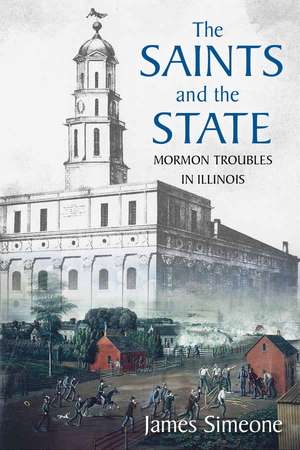The Saints and the State: The Mormon Troubles in Illinois: New Approaches to Midwestern History
Autor James Simeoneen Limba Engleză Hardback – 4 mai 2021
A compelling history of the 1846 Mormon expulsion from Illinois that exemplifies the limits of American democracy and religious tolerance.
When members of the Church of Jesus Christ of Latter-day Saints (known as Mormons) settled in Illinois in 1839, they had been persecuted for their beliefs from Ohio to Missouri. Illinoisans viewed themselves as religiously tolerant egalitarians and initially welcomed the Mormons to their state. However, non-Mormon locals who valued competitive individualism perceived the saints‘ western Illinois settlement, Nauvoo, as a theocracy with too much political power. Amid escalating tensions in 1844, anti-Mormon vigilantes assassinated church founder Joseph Smith and his brother Hyrum. Two years later, the state expelled the saints. Illinois rejected the Mormons not for their religion, but rather for their effort to create a self-governing state in Nauvoo.
Mormons put the essential aspirations of American liberal democracy to the test in Illinois. The saints’ inward group focus and their decision to live together in Nauvoo highlight the challenges strong group consciousness and attachment pose to democratic governance. The Saints and the State narrates this tragic story as an epic failure of governance and shows how the conflicting demands of fairness to the Mormons and accountability to Illinois’s majority became incompatible.
When members of the Church of Jesus Christ of Latter-day Saints (known as Mormons) settled in Illinois in 1839, they had been persecuted for their beliefs from Ohio to Missouri. Illinoisans viewed themselves as religiously tolerant egalitarians and initially welcomed the Mormons to their state. However, non-Mormon locals who valued competitive individualism perceived the saints‘ western Illinois settlement, Nauvoo, as a theocracy with too much political power. Amid escalating tensions in 1844, anti-Mormon vigilantes assassinated church founder Joseph Smith and his brother Hyrum. Two years later, the state expelled the saints. Illinois rejected the Mormons not for their religion, but rather for their effort to create a self-governing state in Nauvoo.
Mormons put the essential aspirations of American liberal democracy to the test in Illinois. The saints’ inward group focus and their decision to live together in Nauvoo highlight the challenges strong group consciousness and attachment pose to democratic governance. The Saints and the State narrates this tragic story as an epic failure of governance and shows how the conflicting demands of fairness to the Mormons and accountability to Illinois’s majority became incompatible.
Preț: 437.40 lei
Nou
Puncte Express: 656
Preț estimativ în valută:
83.70€ • 87.61$ • 69.66£
83.70€ • 87.61$ • 69.66£
Carte indisponibilă temporar
Doresc să fiu notificat când acest titlu va fi disponibil:
Se trimite...
Preluare comenzi: 021 569.72.76
Specificații
ISBN-13: 9780821424469
ISBN-10: 0821424467
Pagini: 436
Ilustrații: 10
Dimensiuni: 140 x 216 x 36 mm
Greutate: 0.56 kg
Editura: Ohio University Press
Colecția Ohio University Press
Seria New Approaches to Midwestern History
ISBN-10: 0821424467
Pagini: 436
Ilustrații: 10
Dimensiuni: 140 x 216 x 36 mm
Greutate: 0.56 kg
Editura: Ohio University Press
Colecția Ohio University Press
Seria New Approaches to Midwestern History
Recenzii
“Today, searing conflicts over who really belongs in America divide the nation. James Simeone’s riveting analysis of the persecution of Mormons in antebellum Illinois details how and why these contests are all too deeply embedded in the dynamics of democratic societies. While struggles over who we are often spur great injustices, Simeone shows how we can draw lessons from them that provide paths to greater understanding, fairness, and civic community.”—Rogers M. Smith, author of Political Peoplehood: The Roles of Values, Interests, and Identities
“Thorough and evocative, Simeone’s work on the Mormons in Illinois fits into a larger discourse on democracy and nationalism. Simeone provides a crucial context for our understanding of the forces and factors surrounding the role of law and order in frontier life. With his brilliant analysis of the interplay of citizenship and the creation of civic worth, Simeone opens new conversations and complicates old ones, and in the process he also presents a rich tapestry of characters. The Saints and the State is an essential contribution to Illinois history and to anyone interested in the intersection of religion and political power.”—Orville Vernon Burton, author of The Age of Lincoln: A History
“While the general contours of this history will not be new to students of the Latter-day Saint past, the explanation of the political forms of the story will provide for most readers a new angle to comprehend it. In that way, the book is a fresh look at events well told. Beyond this contribution, Simeone’s book forces us to ask difficult questions that remain relevant in politics today. How do groups become polarized? How can groups improve toleration? When toleration breaks down, how equipped (and willing) is the state to protect and aid minority groups? Is the majority willing to accommodate the minority and on what, and whose, terms? How can we see and understand the civic worth of groups that are different from us? How groups become polarized within the context of the state’s capacity and power to act to enforce the law is well illustrated by Simeone’s analysis of the history of the Saints’ difficulties in Nauvoo. The tension over political machinations, government institutions, and law enforcement in Illinois provides a powerful example to see how the state works and how it can be improved. These are just a few reasons why the Latter-day Saint experience in Nauvoo still has much to teach us.”—Brent M. Rogers, BYU Studies Quarterly
Notă biografică
James Simeone is a professor of political science at Illinois Wesleyan University and the author of Democracy and Slavery in Frontier Illinois: The Bottomland Republic.
Descriere
James Simeone’s case study uncovers in the 1846 expulsion of Mormons from Illinois an important object lesson for American democracy today, revealing the impossibility of state neutrality in the face of entrenched group beliefs and segregated settlement.





